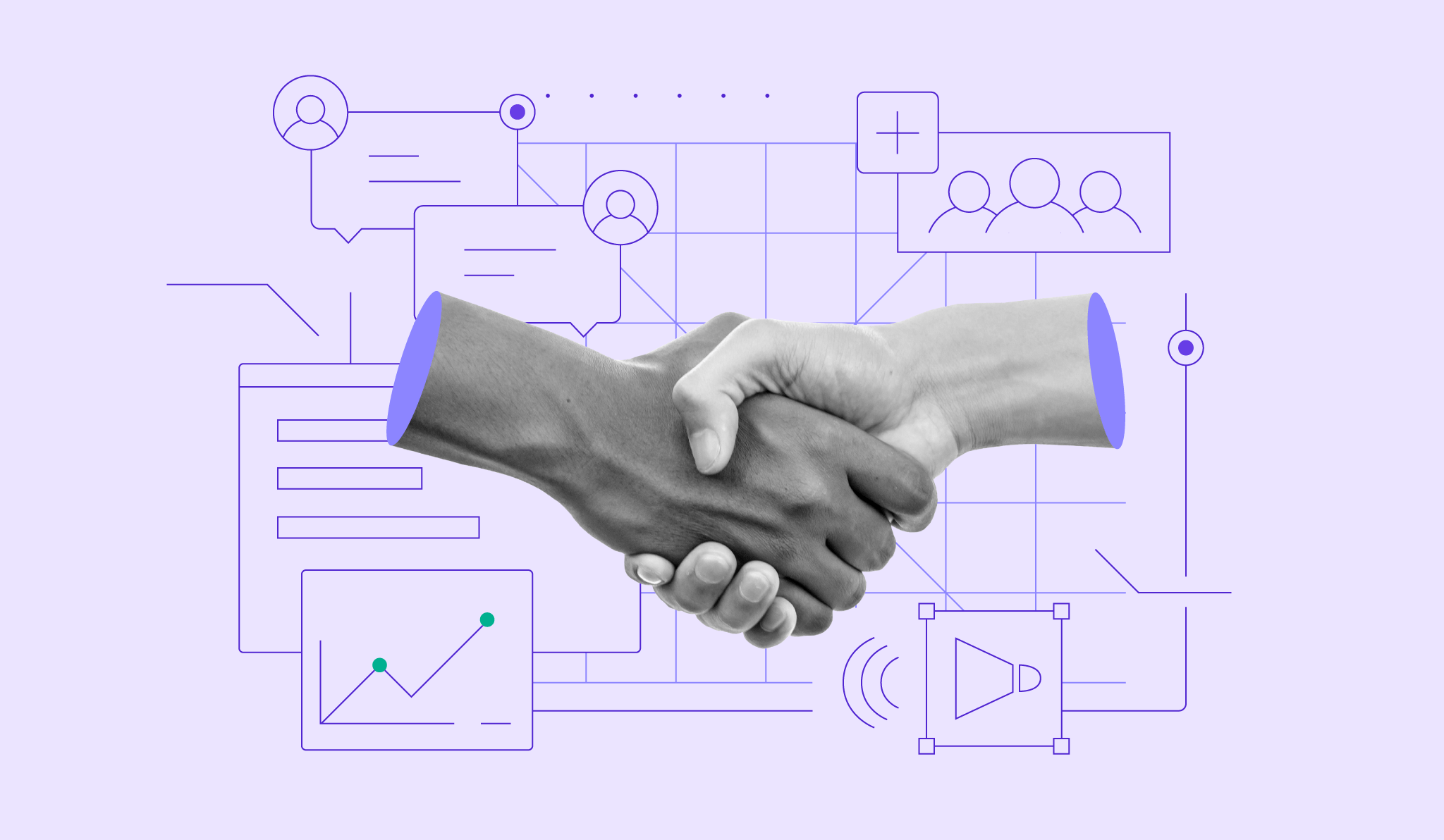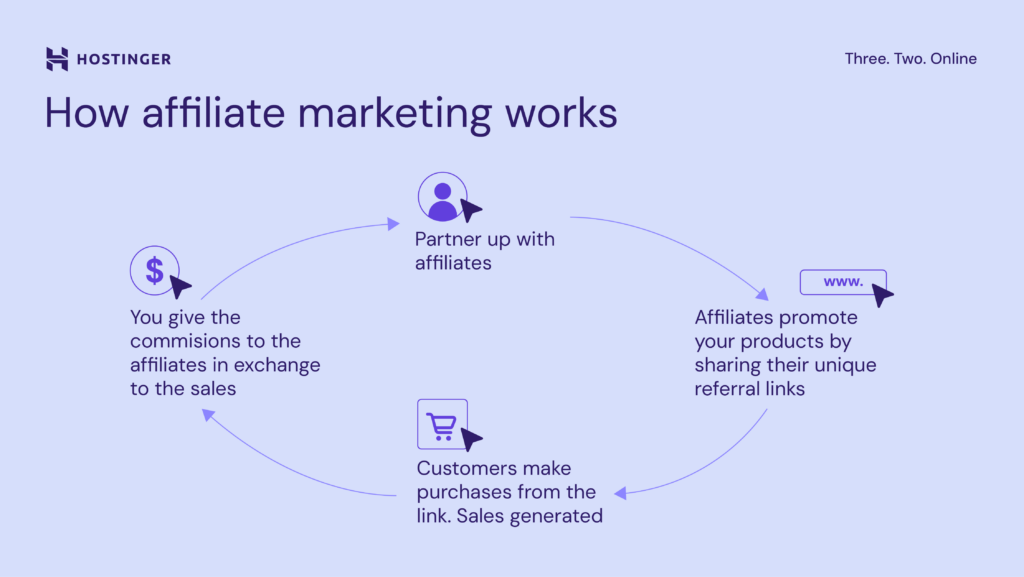Nov 13, 2024
Larassatti D.

Digital marketing encompasses all strategies for promoting products or services through digital channels. On the other hand, affiliate marketing is a part of digital marketing that involves offering commissions in exchange for other people promoting your products.
Both of these marketing strategies can effectively increase revenue, but which one suits your business? In this guide, we’ll explore these two marketing strategies in more detail and share some tips to help you decide which one best suits your business.
Digital marketing vs affiliate marketing: Key differences
See the table below for a quick overview of what makes digital marketing and affiliate marketing different.
| Parameters | Digital marketing | Affiliate marketing |
| Overview | The use of various online channels, such as social media, search engines, and email, to promote products. | A digital marketing strategy that involves partnerships with affiliates to promote products. |
| Audience reach | You’re in full control over the strategies and efforts to broaden your audience reach. | Relies on the affiliates’ existing audience. |
| Marketing channels | There are limitless opportunities to promote products in any channel. | Depends on the platforms used by the affiliates. |
| Cost structure | You may have to spare costs for website development, content creation, digital marketing tools, or paid advertising with varying returns. | Costs are needed to establish the affiliate marketing program and pay affiliate commissions. |
| Level of control | Fully control and manage your business’s brand voice and marketing strategies. | While you can prepare a guideline, affiliates promote your products in their own ways. |
| Measurement and analytics | Often requires proficiency in multiple analytic tools to track performance metrics. | Relies on affiliate tracking software to monitor performance. |
| Time to results | It can take longer to see results, as digital marketing strategies require consistent effort and adjustments over time. | Often provides quicker results, especially if you partner with affiliates with a large following base. |
| Risk | Highly competitive, uncertainty from algorithm changes, and financial risks from higher upfront investment. | Dependency on the affiliates might lead to sales fluctuations. Unethical affiliates might also use fraudulent tactics to fake their performance metrics. |
What is digital marketing?
Digital platforms allow consumers to purchase anything they want from the comfort of their homes. Therefore, digital marketing is all about attracting potential customers while they spend time on the internet.
According to recent digital marketing statistics, the most used digital marketing channels include:
- Websites or blogs can be a central hub to showcase your products, services, and valuable information.
- Social media platforms like Facebook, Instagram, and X allow your business to engage with audiences through posts, stories, ads, and direct messages.
- Emails let you communicate directly with customers by sending newsletters, promotions, and updates.
You can develop various digital marketing strategies on these channels, which generally fall into two main categories: organic marketing and paid marketing.
Organic marketing involves building a presence and attracting traffic naturally without direct advertising costs. It focuses on growing a loyal audience over time through valuable content and engagement. Organic strategies include search engine optimization (SEO), content marketing, email marketing, and social media marketing.
On the other hand, paid marketing involves spending money to promote products on multiple platforms. This approach immediately boosts visibility to a specifically targeted audience. Social media ads, influencer marketing, and pay-per-click (PPC) ads are examples of paid marketing.
Pro tip
Combining organic and pain marketing makes a successful digital marketing strategy. Organic marketing can help build long-term trust and engagement with your audience. Meanwhile, paid marketing efforts give an instant boost for wider reach and higher sales conversions.
To give you a clearer picture of how the synergy works, check out our article that explores 20 organic and paid marketing strategies to drive traffic to your website.
What is affiliate marketing?
Affiliate marketing is a way to promote products or services through other individuals called affiliates. It’s a performance-based marketing strategy, meaning that you pay a commission for every sale made through affiliates’ unique referral links.
Affiliates use digital channels to persuade people to buy your products, making affiliate marketing fall under the digital marketing umbrella term. It’s part of the paid marketing approach, aiming to achieve faster results in exchange for paying commissions.

Affiliate marketing benefits both businesses and affiliates. By creating an affiliate marketing program, businesses can attract people to promote their products. Meanwhile, affiliates can earn passive income from the commissions.
If you want to build an affiliate marketing program, you’ll need a tracking tool to monitor affiliates’ performance and manage commission payouts. Mastering partnership management will also help you maintain good communication with affiliates and persuade new ones to join.
Choosing the right marketing strategy for your business
Whether digital marketing or affiliate marketing is right for your business depends on your current situation. Considering these factors will be beneficial for making an informed decision:
Business objectives
Defining marketing objectives based on your business’s current situation helps you prioritize resources effectively, set realistic success metrics, and stay adaptable as your business grows.
If your goal is to increase brand awareness and engage with your audience, digital marketing is the perfect option. On the other hand, just doing affiliate marketing is better if your primary objective is to boost conversions.
Expert’s Insights
The best time to start building an affiliate marketing program depends on your business goals, resources, and readiness to support affiliates. To maximize its benefits, it’s ideal to start affiliate marketing after gaining some brand awareness so you can build trust with both potential affiliates and customers.
Resources
Evaluate your available resources (including budget, time, and human resources) to plan, execute, and monitor the marketing strategies.
Digital marketing may require a higher investment upfront, especially for paid advertising, tracking tools, and content creation costs. With affiliate marketing, the affiliates handle much of the promotional work, but you may need some upfront costs to set up the affiliate tracking system. Also, note that planning the commission structure, preparing affiliate guidelines, managing partnerships with the affiliates, and scouting new ones require time investment.
Target audience and niche
Find out where your audience spends time online and how they prefer to engage with brands.
Digital marketing provides many opportunities to connect with potential customers through tailored content and ads across platforms. Only doing affiliate marketing works well if you’re targeting a specific niche, as affiliates often have an established audience who trust their recommendations.
Level of control
Digital marketing strategies give you complete control over how you want to engage with your audience. Meanwhile, with just affiliate marketing, you’re letting the affiliates represent your brand, giving you less direct oversight.

Conclusion
Digital marketing helps you drive sales and traffic by building brand awareness across digital channels. Affiliate marketing relies on affiliates to promote your products in exchange for commissions, focusing on boosting sales.
With these in mind, consider assessing your goals and current resources to identify the more realistic marketing strategy to pursue. Focusing on what’s manageable now sets a solid foundation for growth, as you can always refine, adjust, and scale your approach over time.
If you’ve tried implementing digital marketing or affiliate marketing, how do you make the most of it? Feel free to comment below to start a discussion.
Digital marketing vs affiliate marketing FAQ
Which is better, digital or affiliate marketing?
Affiliate marketing is also a part of digital marketing, so neither is better than the other, as they usually go hand in hand. Digital marketing establishes your brand and audience base, whereas affiliate marketing adds to them by expanding your reach and driving higher sales conversions.
Which is more profitable, digital or affiliate marketing?
It depends on your goals and budget. Digital marketing generates long-term profit by gradually building your brand’s digital presence. Meanwhile, affiliate marketing brings instant profit from sales, but you will depend on the affiliates’ audience base. With the right planning and adjustments, both can effectively increase your revenue.
What skills are required for digital and affiliate marketing jobs?
They vary from role to role. However, skills in search engine optimization (SEO), search engine marketing (SEM), data analytics, content creation, partnership management, and social media marketing are commonly expected for digital and affiliate marketing jobs.





